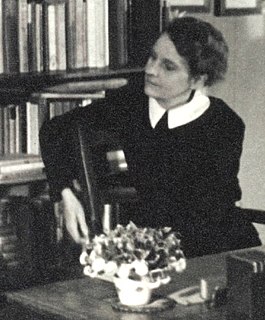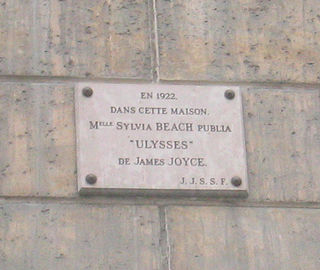
The Lost Generation was the social generational cohort that came of age during World War I. "Lost" in this context refers to the "disoriented, wandering, directionless" spirit of many of the war's survivors in the early postwar period. The term is also particularly used to refer to a group of American expatriate writers living in Paris during the 1920s. Gertrude Stein is credited with coining the term, and it was subsequently popularized by Ernest Hemingway who used it in the epigraph for his 1926 novel The Sun Also Rises: "You are all a lost generation".

Antoine Marie Jean-Baptiste Roger, comte de Saint-Exupéry, simply known as de Saint-Exupéry, was a French writer, poet, aristocrat, journalist and pioneering aviator. He became a laureate of several of France's highest literary awards and also won the United States National Book Award. He is best remembered for his novella The Little Prince and for his lyrical aviation writings, including Wind, Sand and Stars and Night Flight.

The Little Prince is a novella by French aristocrat, writer, and aviator Antoine de Saint-Exupéry. It was first published in English and French in the US by Reynal & Hitchcock in April 1943, and posthumously in France following the liberation of France as Saint-Exupéry's works had been banned by the Vichy Regime. The story follows a young prince who visits various planets in space, including Earth, and addresses themes of loneliness, friendship, love, and loss. Despite its style as a children's book, The Little Prince makes observations about life and human nature.

Sylvia Beach, born Nancy Woodbridge Beach, was an American-born bookseller and publisher who lived most of her life in Paris, where she was one of the leading expatriate figures between World War I and II.

Adrienne Monnier was a French bookseller, writer, and publisher, and an influential figure in the modernist writing scene in Paris in the 1920s and 1930s.

Consuelo, comtesse de Saint-Exupéry, was a Salvadoran-French writer and artist, and was married to the French aristocrat, writer and pioneering aviator Antoine de Saint-Exupéry.

Shakespeare and Company was the name of the iconic English language bookstore founded by Sylvia Beach in 1919 on Paris' Left Bank, and where Beach went on to publish James Joyce's "Ulysses." A later independent English-language bookstore was opened in 1951 by George Whitman, also located on Paris' Left Bank, but under a different name. Whitman adopted the "Shakespeare & Co." name for his store in 1965, and it continues to operate under that name to this day.

Gisèle Freund was a German-born French photographer and photojournalist, famous for her documentary photography and portraits of writers and artists. Her best-known book, Photographie et société (1974), is about the uses and abuses of the photographic medium in the age of technological reproduction. In 1977, she became President of the French Association of Photographers, and in 1981, she took the official portrait of French President François Mitterrand.

Stacy Madeleine Schiff is an American former editor, essayist, and author of five biographies; her biography of Vera Nabokov, the wife and muse of the Russian-American novelist Vladimir Nabokov, won the 2000 Pulitzer Prize in biography.
Jean Prévost was a French writer, journalist, and Resistance fighter.

Noël Riley Fitch is a biographer and historian of expatriate intellectuals in Paris in the first half of the 20th century. She is the author of several books on Paris as well as three biographies: Sylvia Beach and the Lost Generation (1983), translated into Japanese, Spanish, German, Italian and French; Anaïs: The Erotic Life of Anaïs Nin (1993), published in French, German, Spanish, Portuguese, and Polish, and nominated for the Grand prix des lectrices de Elle; and she is the first authorized biographer of Julia Child, with Appetite for Life: the Biography of Julia Child (1997). The Ernest Hemingway book, a biographical and geographical study of his Paris years, has been published in Dutch, the Cafés of Paris book in Dutch and German.

A Sense of Life is the 1965 English translation of Un Sens à la Vie, by the French writer, poet and pioneering aviator, Antoine de Saint-Exupéry. The original French compilation was published posthumously in 1956 by Editions Gallimard and translated into English by Adrienne Foulke, with an introduction by Claude Reynal. Saint-Exupéry was killed during the Second World War while flying for the Free French Air Force.

Night Flight is a 1933 American pre-Code aviation drama film produced by David O. Selznick, distributed by Metro-Goldwyn-Mayer, directed by Clarence Brown and starring John Barrymore, Lionel Barrymore, Clark Gable, Helen Hayes, Robert Montgomery and Myrna Loy.

The rue de l'Odéon is a street in the Odéon quarter of the 6th arrondissement of Paris on the Left Bank. Because of the presence of two bohemian bookstores, run respectively by Adrienne Monnier and Sylvia Beach, and the coterie of emergent Anglophone writers surrounding them, James Joyce nicknamed it "Stratford-on-Odéon". Monnier and Beach thought of it as Odéonia.

"The Aviator" is the 1965 English translation of a short story, L'Aviateur, by the French aristocrat writer, poet and pioneering aviator, Antoine de Saint-Exupéry.
Jean Israël was a heroic French Air Force pilot during the Second World War, and a key subject in the non-fiction literary work Flight to Arras written by Antoine de Saint-Exupéry.
Laure Murat is a French historian and writer.
Disavowals or cancelled confessions is an anti-realist, surrealist autobiography by Claude Cahun. It was created to serve as a critique of the dominant cultural conservatism in France through the subversion of traditional autobiography with the use of illustrated photomontages alongside the artist's own aphorisms in the aftermath of World War I.
Shari Gabrielson Goodmann, who published under the name Shari Benstock (1944-2015) was a feminist literary scholar. She was an expert on literary modernism, and a biographer of Edith Wharton.

Stratford-on-Odéon was both a literary circle and James Joyce's affectionate nickname for the Rue de l'Odéon in Paris's Left Bank, its two bookstores and the "coterie of emergent Anglophone writers surrounding them".















